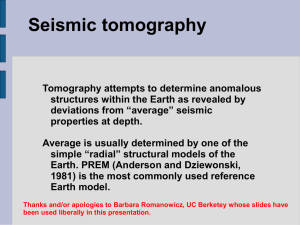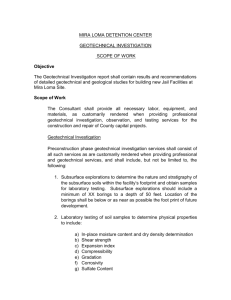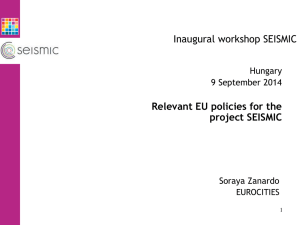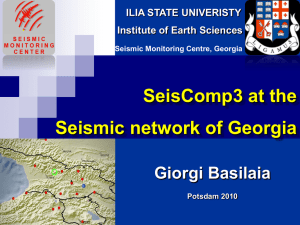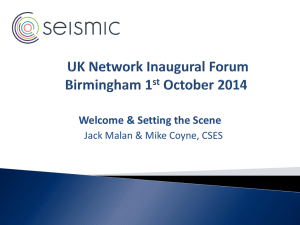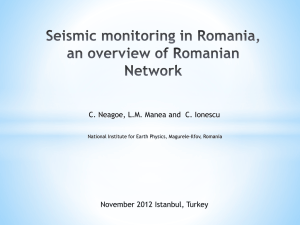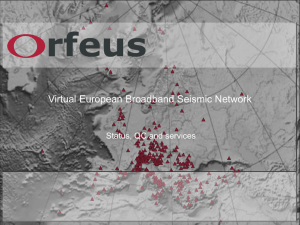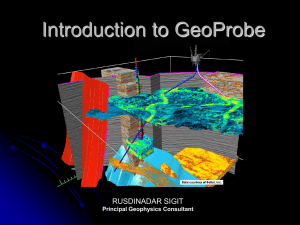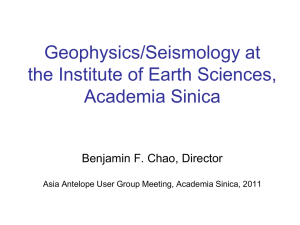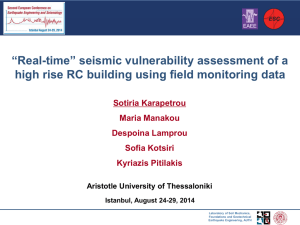71-82 XC enhanced support installed 71
advertisement
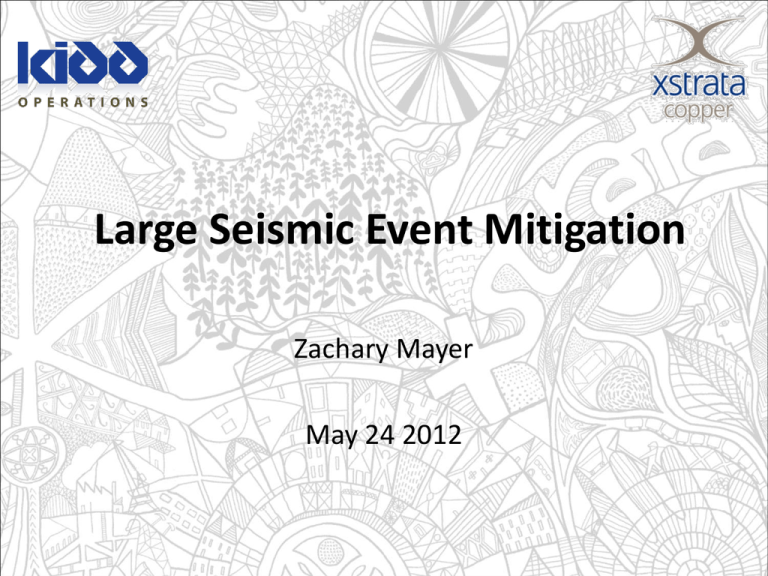
Large Seismic Event Mitigation Zachary Mayer May 24 2012 Agenda • • • • • • What Happened Project Goals and Results Timeline of Geotechnical Studies Risk Mitigation Ground Support Standards Geotechnical Modelling Results 2 2009 & 2011 Seismic Events • Jan 6/2009: 3.8 Mn event on 7000L. • June 15/2009: 3.1 Mn event on 7500L. • Aug 21/2011: 3.2 Mn event on 7500L. • Sept 13/2011: 3.8 Mn event on 7000L. 3 Seismic Project Goal and Results Determine what happened • Horizontal stress fault slip in pillar. Structure & geometry. Can seismic models reproduce the events? • Yes – now have a better understanding. Can we control the events? • New mining sequence will not eliminate seismic events, but should reduce maximum magnitude going forward. Can we manage the impact of large events? • Yes - New support standards are effective in reducing damage/risk. Additional reinforcement in key areas. • Re-entry protocols. Expanded the post-blast closure areas and increased personnel re-entry times. 4 Timeline of Geotechnical Risk Studies and Mitigation Efforts 2004 Mine-D Seismic System Upgrade 2001 2000 1996 Deep Mining Forum 2006 Begin Geotechnical Risk Assessments 2003 Begin Mine D modelling 2000 Mine D Feasibility 2002 2003 2004 2005 2006 2007 2012 Forensic + Forward Communication Modelling Screens 2009 Industry/Technical Review of Events & Investigation 2007 Implement MS-RAP software 2002 Begin Analysis of 3-Mine Phase 2 sequence 2008 2010 External Audits 2009 Add GC Staff 2009 2010 2011 2012 Industry/ Expert Tehnical Peer Review Panel Review 2011 2012 2009 2011 Implement Re-Entry 2008 Seismic System Protocols Annual Update Upgrade of Geotechnical 2010 (Palladin D-Mine) Mine Design Doc Update 2012 Risk Register Alternate Mine 2007 Sequence ESS Modelling 2009 Selected Begin Enhanced Support 2012 Installation Program Seismic 2006 Overhaul Support Strategy 2004 First Cone-Bolts Installed large seismic events 2009 Sequence Changes Support Standard Upgrades Modelling Monitoring 2010 Tomography 2010 Seismic System Upgrade (Palladin) 5 Ground Control Experts Involved in Kidd Study (2009-2012) • • • • • • • • • • • • • Patrick Andrieux – Itasca Consulting, Sudbury David Beck – Beck Engineering, Australia Wilson Blake – Independent Consultant, USA Richard Brummer – Itasca Consulting, Sudbury John Fedorowich – Itasca Consulting, Sudbury Anneta Forsythe – ex-Kidd/Itasca now Vale, Sudbury John Henning – ex-Kidd now Goldcorp, Timmins Marty Hudyma – Laurentian University, Sudbury Steve McKinnon – Queens University, Kingston Rob Mercer – Knight Piesold, North Bay Brad Simser – Xstrata Nickel, Sudbury Graham Swan – Ex-Falconbridge, Sudbury Erik Westmin – Virginia Tech, USA 6 Geotechnical Risk Studies Additional Mitigation Efforts 2011-2012 • Geotechnical analysis through detailed stress and structural models by 2 different consultants. • Historical sequence modelling back to 2001 to try to recreate and understand events. Stress Model Displacement model Seismic Velocity 7 Risk Mitigation • Enhanced support installation from 6000L to 9500L – the PPE of the mine. • Re-entry protocols. Expanded the post-blast closure areas and increased personnel re-entry times. • Currently shutting down between 2-4 levels for 12+ hours approximately 140 times/year. • Revised mining sequence. • Revised support standards (lower screen & bolt to floor). • Six Sigma project– single-pass “in cycle” enhanced support. • Ongoing monitoring for deviation - SMART cable installation in intersections. 8 Geotechnical Risk Studies Additional Mitigation Efforts 2011-2012 • Forensic data mining looking for correlations. • Confirming and adjusting ground support in damaged areas. • Additional cable bolting in sensitive areas. • Instrumenting more intersections. • Investigating new seismic monitoring technology. • Passive seismic tomography study. • Additional microseismic system upgrades. 9 Damage Comparison 2009 vs. 2011 Enhanced Support Works 3.8Mn - Jan 2009 71-01S Complete collapse of back After 2009 rockburst: • 4 intersections collapsed • Drift damaged over hundreds of meters • Several areas inaccessible 3.8Mn - Sept 2011 71-01S Failure limited to bottom half of walls After 2011 rockburst: • No intersections collapsed • Walls damaged over tens of meters • No areas inaccessible 10 Enhanced Support Works 71-82 XC enhanced support installed 71-82 XC after 3.8Mn event 11 7700L Refuge Station Upgrades 12 7400L Ramp Upgrades 13 69-S40 ACC Single-Pass Enhanced Support Installed “In Cycle” 14 Modelling Results Example Seismic Potential 2013 Original Mining Plan New Mining Plan Red areas represent potential seismic zones 16 Conclusion • New technology and tools provided better analysis and planning information. • Have modelled that we can do something different - new mining sequence reduces risk. • Expert consensus obtained on path forward. • Enhanced support is doing it’s job. • Expanded re-entry protocols keeping people out of harms way. Questions? 17
